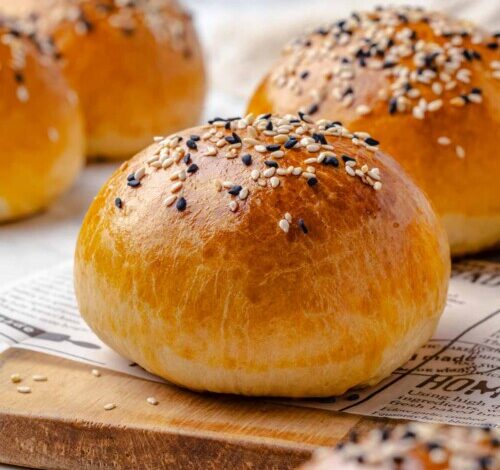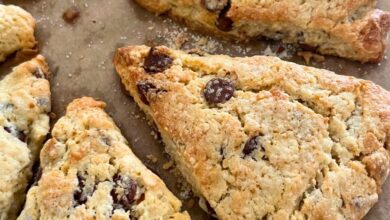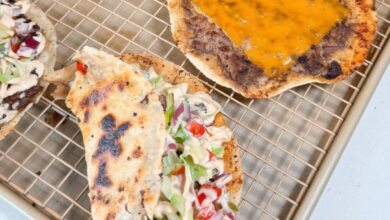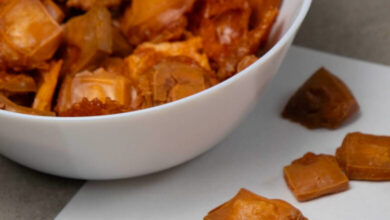Sourdough Diiscard Hamburger Buns Recipe

If you’re a sourdough baker, you’ve likely asked yourself: What can I do with all this sourdough discard? Instead of throwing it away, why not turn it into something incredibly delicious like soft, fluffy, homemade hamburger buns?
These sourdough discard hamburger buns are a great way to reduce food waste while adding rich, slightly tangy flavor to your burgers or sandwiches. The discard adds depth to the dough without requiring a full sourdough fermentation, so you can still make them in a few hours.
Whether you’re firing up the grill or meal prepping for the week, these buns are the perfect addition to any table. They’re soft yet sturdy enough to hold up to all your favorite fillings — and you’ll never go back to store-bought buns again!
🕒 Cooking Time & Servings
-
Prep Time: 15 minutes
-
Rise Time: 1.5 to 2 hours
-
Bake Time: 20 minutes
-
Total Time: ~2 hours 30 minutes
-
Yield: 8 hamburger buns
🧾 Ingredients
For the Dough:
-
1 cup sourdough discard (unfed, room temp)
-
1 cup warm milk (or plant-based alternative)
-
2 tbsp sugar (or honey)
-
1 packet (2 ¼ tsp) active dry yeast
-
4 tbsp butter, softened (or olive oil)
-
3 ½ cups all-purpose flour (plus more for kneading)
-
1 ½ tsp salt
For Topping:
-
1 egg, beaten (for egg wash)
-
Sesame seeds (optional)
👩🍳 How to Make Sourdough Discard Hamburger Buns
Step 1: Activate the Yeast
-
In a large bowl, combine warm milk and sugar. Stir in the yeast and let it sit for 5–10 minutes, until foamy.
Step 2: Mix in the Wet Ingredients
-
Add the sourdough discard and softened butter to the yeast mixture. Stir to combine.
Step 3: Add Dry Ingredients
-
Gradually add flour and salt, stirring until a dough forms. Turn it out onto a floured surface and knead for 8–10 minutes, until smooth and elastic.
Step 4: First Rise
-
Place dough in a greased bowl, cover with a towel or plastic wrap, and let rise in a warm place for 1 to 1.5 hours, or until doubled in size.
Step 5: Shape the Buns
-
Punch down the dough and divide into 8 equal pieces. Shape each into a smooth ball and flatten slightly. Place on a parchment-lined baking sheet, spaced apart.
Step 6: Second Rise
-
Cover and let rise again for 30–45 minutes, until puffy.
Step 7: Egg Wash & Bake
-
Preheat oven to 375°F (190°C). Brush each bun with beaten egg and sprinkle with sesame seeds (optional).
-
Bake for 18–22 minutes, or until golden brown on top.
Step 8: Cool & Serve
-
Let the buns cool on a wire rack before slicing. Serve with your favorite burger fillings or sandwich toppings!
📝 Notes
-
Discard tips: Use discard that’s no older than a week and hasn’t developed a strong sour taste for best results.
-
Make-ahead: Freeze fully baked buns in an airtight bag for up to 2 months. Thaw and reheat as needed.
-
Vegan option: Use plant-based milk, olive oil instead of butter, and skip the egg wash or use plant milk for brushing.
-
Flavor boosters: Add garlic powder, onion powder, or herbs to the dough for a twist.
❓ FAQs
Q: Can I make this without yeast?
A: No — this recipe relies on yeast for rising. Discard alone won’t rise the dough sufficiently.
Q: Can I use whole wheat flour?
A: You can substitute up to half the flour with whole wheat, but it may yield a denser bun.
Q: Can I let the dough rise overnight?
A: Yes! Cover and refrigerate the dough after kneading for an overnight slow rise. Let it come to room temp before shaping.
Q: Why use sourdough discard in a yeasted recipe?
A: Discard adds flavor and moisture. It’s not the rising agent here, but it makes the buns extra tasty and reduces waste.
🍽️ Nutrition Facts
Per Bun (1 of 8):
| Nutrient | Amount |
|---|---|
| Calories | 220 kcal |
| Total Fat | 6g |
| Saturated Fat | 3g |
| Cholesterol | 35mg |
| Sodium | 320mg |
| Total Carbs | 34g |
| Fiber | 1.5g |
| Sugar | 3g |
| Protein | 6g |
Note: Nutrition may vary based on ingredients and toppings used.
⚠️ Disclaimer
This recipe contains gluten, dairy, and eggs unless substitutions are made. Always read ingredient labels and consult your healthcare provider if you have food allergies or sensitivities. While homemade buns are more nutritious than many store-bought options, they should be consumed in moderation as part of a balanced diet.




